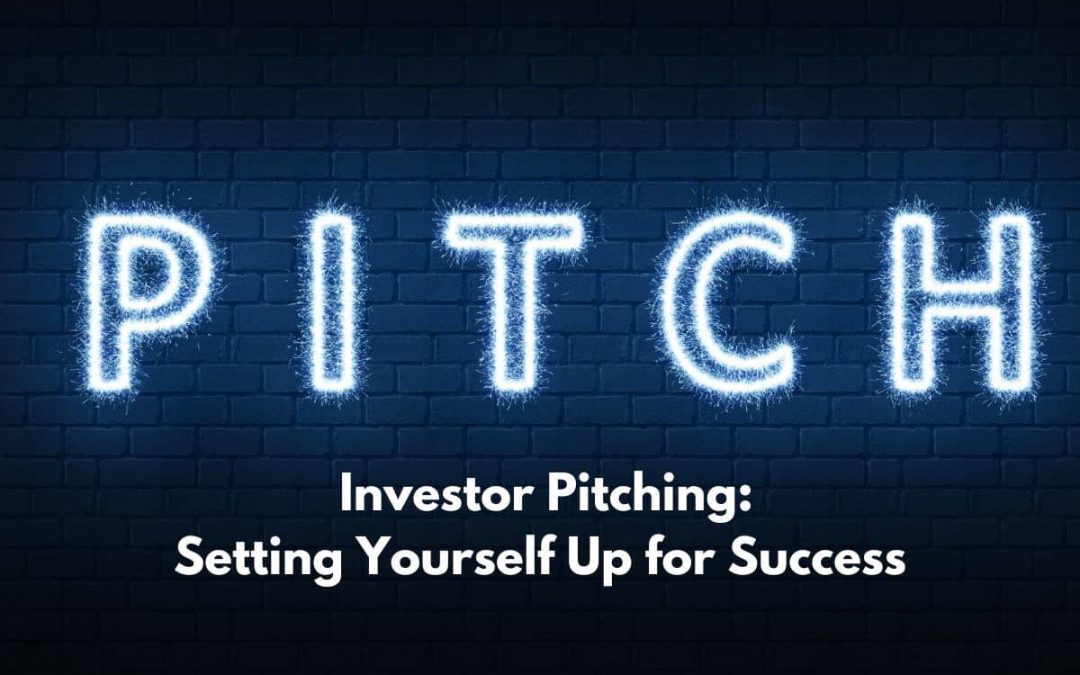
Investor Pitching: Setting Yourself Up for Success
INVESTOR PITCHING: SETTING YOURSELF UP FOR SUCCESS
A few months ago, I was asked to write an article for Women Founders Network’s blog because I had successfully coached several entrepreneurs to wins in their fast-pitch competition over the past few years. My article on “Setting Yourself Up for Success with Investors” is provided below, and I have prefaced it with some recommendations for pitching to investors during times of economic uncertainty.
With the current economic slowdown, the investor landscape is becoming increasingly competitive, so you need to be even more prepared and polished than before. Supply and demand have shifted because less money is being invested overall by venture capital (VC) firms, private investors, and angel investors. This means that they have a greater advantage and may expect more from startups.
Investors will want more assurances and proof that companies seeking funding are operating leanly, pivoting when necessary or possible, and planning for what could be an uncertain path over the next few years.
PART 1: ADJUSTMENTS TO MAKE TO YOUR INVESTOR DECK AND YOUR PITCH
When marketing anything, including marketing your company to investors, think about the goals, needs, challenges, and fears of the people you are addressing. The more you understand the perspective of investors, the more you can tailor your pitch and deck accordingly. Aim to address the most important questions and objections that are in their minds during your presentation.
Here are some adjustments to consider making to your investor pitch deck and your presentation:
Be ready to talk about how recent economic variability has affected your industry and, if you’re currently operating, your business. Also, plan to discuss how you will adapt your business practices to suit the current economic climate.
Budget for a long enough runway to carry your company through a possible downturn or slow economic growth period.
Show that you can conserve cash and demonstrate extreme fiscal responsibility. Founders that have built their companies through bootstrapping know what it feels like to spend their own money. They have a personal connection to it. In this current environment, startups would be wise to do the same with investors’ money even in the planning and pitching stages.
Adjust your projections to reflect any anticipated decrease in demand for your product or service unless you’re in a sector that has been unaffected or positively affected by economic uncertainty. For some businesses, basing your projections on data from respected economic analysts or institutions can provide added credibility.
Be specific when talking about your marketing plans. Many startups are too vague when talking about marketing strategies. In periods of economic uncertainty, investors will want to see that you’re very carefully thinking through how you will attract and retain customers who may be more reluctant to spend money than usual.
Emphasize the strength and resilience of your team. If you, as a team or individually, have a brief story about overcoming tough times or finding a way to turn a bad situation into an opportunity, work it into your pitch. Many investors place great stock in the character of the founder and team when deciding whether or not to invest in a company.
Express flexibility regarding terms and your openness to greater input from investors. Because of the current economic climate, some investors will want to provide more guidance than usual to investee companies to help protect their investments. Investors may expect more frequent communication from you regarding progress and reaching milestones.
PART 2: SETTING YOURSELF UP FOR SUCCESS WITH INVESTOR PITCHING
Preparing to pitch to investors can elicit a mix of excitement, fear, and confusion. Getting clear on what investors want, gaining a deep understanding of the details of your business, and creating some new habits will help you to deliver the best investor pitch you can make.
I’ve been fortunate to work with some amazing entrepreneurs in my business and as a volunteer coach for Women Founders Network’s WFN Fast Pitch competition.
Over the past three years, the people I have coached for WFN have all ended up in the winner’s circle: Sashee Chandran, Founder and CEO of the innovative tea company, Tea Drops, who won first place in 2017; Sabena Suri, Co-founder and Chief Strategy Officer of the gifting company, Box Fox, won second place in 2018; and Paris Sabo, MD, Co-founder and COO of the natural oral care company, Dr. Brite, won second place in 2019.
While their companies and offerings differed greatly from one another, there are several things these three women had in common and several things we did in our work together. Here is advice you can use to achieve similar success with your investor pitches.
EMBODY THE 4 Ps – Be Passionate, Problem-solving, Prepared and Perseverant
An entrepreneur who embodies the 4 Ps will not only impress investors but will be more likely to succeed in almost any endeavor. You will need a genuine passion for your business to drive you through the process of preparing your investor deck and preparing yourself to pitch to, and work with, investors. You will also need to be able to passionately describe what you do, which is part of the preparation process I put clients through.
Your ability to solve problems will be tested throughout the process of preparing for investor pitches and in your business, in general. If you’re not naturally a person who sees obstacles as opportunities, this is a time to focus on shifting your mindset. In your investor pitch, you can demonstrate how you solve problems as you talk about certain aspects of your business. Investors like to learn how your mind works.
Preparation is the key to a great investor pitch! In my work with Sashee, Sabena, and Paris, we worked on everything, from their investor decks to word choices and nonverbal communication, to responses to typical and challenging questions investors might ask. Each of these women stuck with it and did the work they needed to do, which leads to the final “P”.
Perseverance is essential in business. You will inevitably face challenges as you prepare to pitch to investors and throughout the fundraising process. Your ability to keep going is necessary for success.
KNOW YOUR NUMBERS INSIDE AND OUT
Investors will expect you to “know your numbers”, such as your cost of goods, profit margins, customer acquisition cost, burn rate, and more. If you have ever watched ABC TV’s Shark Tank or attended Women Founders Network’s Dolphin Tank or Fast Pitch events, you will hear the same questions asked over and over again.
If you take a step back to look at your business the way an investor would, you will feel clearer on how important the numbers of your business are in helping them to make a defensible investment decision.
In working with Sashee, Sabena, and Paris, each of them worked diligently to find the answers to my questions about certain numbers that were important in telling the stories of their respective businesses.
STAY TRUE TO YOURSELF AND YOUR BRAND
As you look around and see what other successful entrepreneurs are doing, it’s easy to think that if you simply copy them you will achieve the same results they have. It is not that simple. It is important to polish your presentation skills. However, if you stray too far from your natural way of communicating, you will probably feel extra nervous and appear stilted or inauthentic.
Sashee, Sabena, and Paris did exceedingly well at mastering their material so they could deliver it naturally and with heart. I believe this is part of what led to their success in the competition and subsequent endeavors.
DEVELOP AND EDUCATE YOURSELF CONSTANTLY
Continually refine your presentation skills so you will be ready for the next opportunity. After our work together with WFN’s Fast Pitch, Sashee worked with me to prepare her for the Tory Burch Foundation competition where she won first place and $100,000, and appearances on HSN where her product sold out.
One thing I tell all of my clients is to read and watch the news regularly. Then, consider how world events or changes in your industry could affect your business and how you can adapt or even thrive as a result of current events. If you want to become great at pitching to investors, read and listen to podcasts about pitching to investors, business, and your industry. Become an expert in your field, if you’re not already.
All of these actions will leave you better informed, more confident, and more insightful about your business and the world of pitching to investors.
 This article was written by Lisa Elia, Investor Pitch Coach, Media & Presentation Trainer, and Founder of Expert Media Training. Lisa has coached clients to raise millions of dollars at all stages of investment, including IPOs. She has volunteered as a pitch coach for WFN’s Fast Pitch competition and donates time to other organizations that empower entrepreneurs. She brings to her work experience gained during decades of working as a high-level publicist and a speaker who has spoken to thousands of audiences over the years.
This article was written by Lisa Elia, Investor Pitch Coach, Media & Presentation Trainer, and Founder of Expert Media Training. Lisa has coached clients to raise millions of dollars at all stages of investment, including IPOs. She has volunteered as a pitch coach for WFN’s Fast Pitch competition and donates time to other organizations that empower entrepreneurs. She brings to her work experience gained during decades of working as a high-level publicist and a speaker who has spoken to thousands of audiences over the years.
For a complimentary consultation, call 310-479-0217.
Or, email team@expertmediatraining.com




